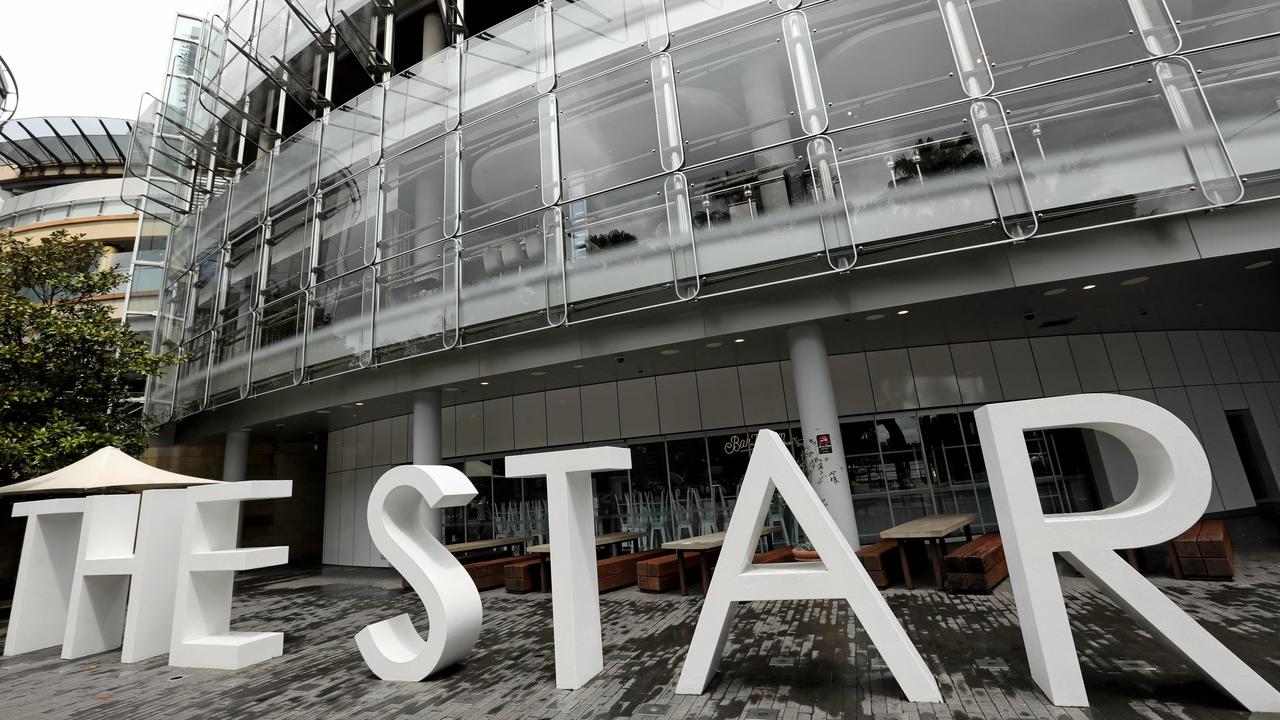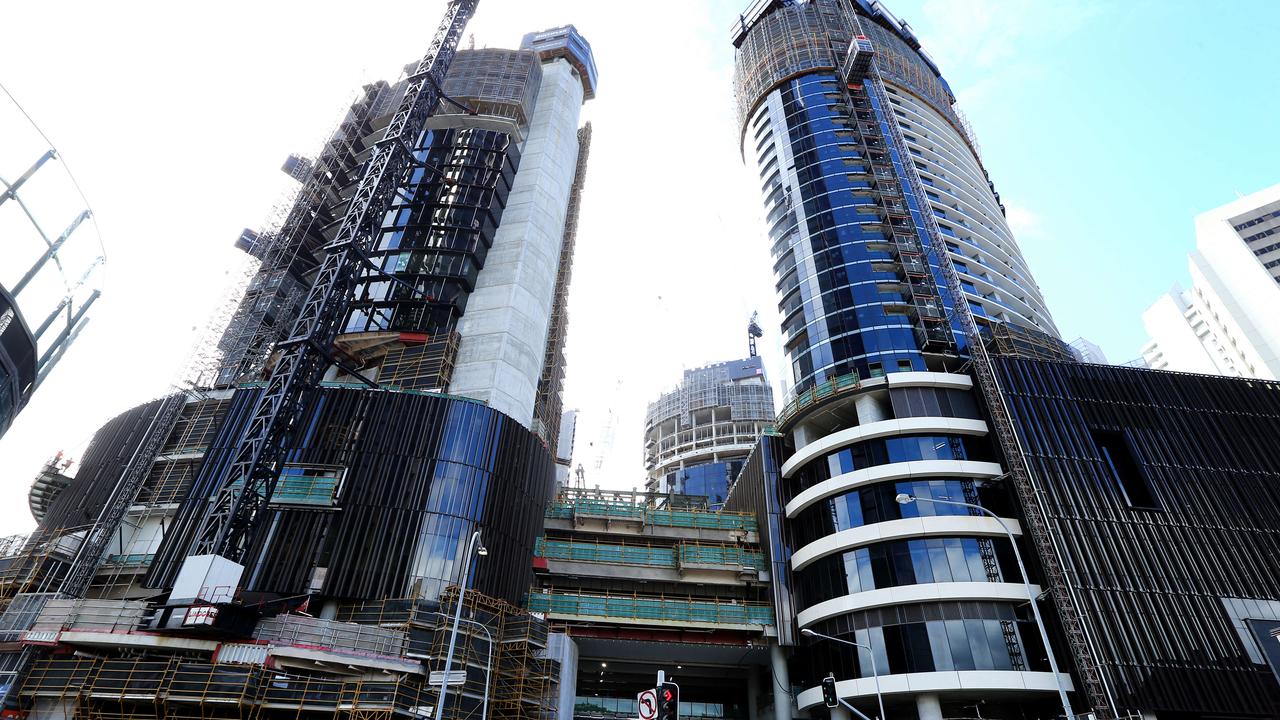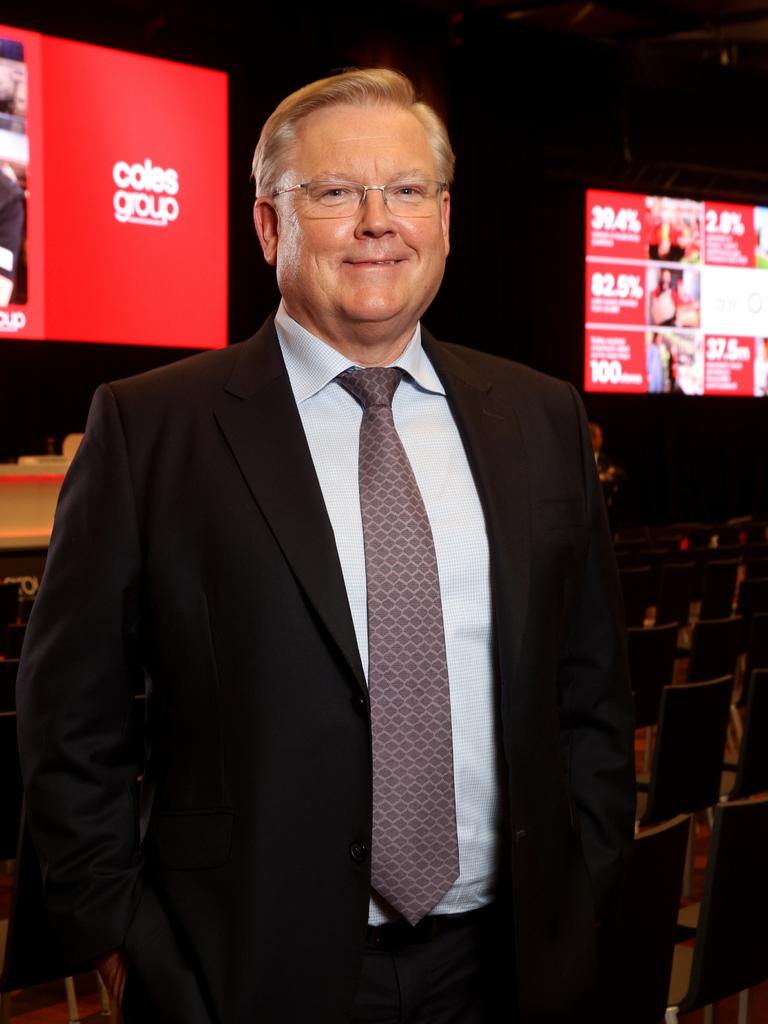Can a banker really save a fallen Star? Don’t bet on it
A new chairman will be in the hot seat if a private equity player wants to take a high stakes punt on the out-of-luck casino operator.

Business
Don't miss out on the headlines from Business. Followed categories will be added to My News.
Former Suncorp banker David Foster will have his work cut out rebuilding the foundations for deeply troubled casino operator Star Entertainment.
Indeed, it could be Foster in the hot seat if a private equity player wants to take a punt with a high risk – but potentially high reward – buyout of Star.
At $1.44 each, Star shares are plumbing an all-time low and are below their ultra-deep discount when Covid-19 lockdowns first hit and no revenue was coming through the doors of its Sydney and two Queensland casinos.
The business that is facing so much uncertainty is worth a fraction of the assets sitting on its balance sheet.

Foster, who this week took charge as Star’s new chairman, has plenty of scars from his frontline experience with corporate crashes. He took charge of Suncorp’s badly wounded banking business just when the global financial crisis hit and the regional bank’s commercial arm was dangerously exposed to toxic property loans.
It was with former Suncorp chief financial officer Chris Skilton that Foster devised and oversaw a survival plan, including splitting the lender into a good and bad bank to stem the bleeding.
Foster ultimately oversaw the sale of billions of loss-making loans and running down others, putting in the foundations for Suncorp to be the low-risk lender it is today.
Well-regarded and newly appointed chief executive Robbie Cooke is in place and will see the actual reconstruction, but the low-profile Foster needs to build out the governance and cultural expectations after Star got it so badly wrong.
Foster replaces Ben Heap, who became executive chairman as the casino operator’s board imploded following a damning Bell inquiry in NSW. That coincided with a separate Queensland inquiry, the Gotterson Review.
Both inquiries came to the broad conclusion that for years Star allowed an environment of looking the other way when it came to profits being bolstered by potential criminal activity.
For now Star’s right to operate in NSW and Queensland is hanging by a thread. The casino, which is nearing the final phase of a $3.6bn redevelopment of its Queens Wharf project in Brisbane, has until the end of the year to show why it should retain its licence. In NSW the licence is held by a special manager.
Heap needed to go to allow Star to move forward, however he has done much of the early heavy lifting. This includes recruiting a room of new and experienced directors; getting an $800m equity raising away to pay down debt; and getting a CEO in place.
This has given Cooke the space to rebuild the management team and operationally getting Star back on track following a wave of departures last year – many of these forced following the damning reviews.

Even so, rebuilding efforts were given a serious credibility setback on Monday – Foster’s first day in the role – when the executive in charge of driving transformation, Scott Wharton, resigned to lead listed salary packaging player Smartgroup.
While Foster is these days Sydney based, his role in saving a cherished Queensland bank at a critical time will help the operator put its best foot forward when it comes to saving its licence there.
Until last year, Foster chaired Brisbane’s MotorCycle holdings and he currently chairs childcare major G8 Education, also based in Brisbane. It helps too that Cooke for years ran another Queensland institution, Tatts Group (now The Lottery Corp) that was built up around the state’s wagering business.
Foster’s other big challenge is the NSW casino duty hike proposed that now hangs in the balance under a new state government.
The changes will need to be passed by NSW Parliament and the new Labor government has a minority to work through a less-than-lower house. The prospect of a tax increase (which has already been factored into state government budget estimates) has sliced more than $1bn from the value of its Sydney operations.
Both Foster and Cooke will be looking to convince new NSW Premier Chris Minns of another way around this. This could include an easy win on gambling reforms including a trial of the cashless gaming card without the need for Parliament’s support.
The harder sell is the level of annual spending at stake.
On Jarden’s numbers, the higher tax regime would be unlikely to justify a “business as usual” capex bill of $60m in Sydney, while a material investment on a midlife upgrade of the Pyrmont site would very likely be wound back.
For now though, saving Star’s licence is Foster’s number-one job. He has until the end of the year to prove at least it’s an entirely new casino from the ground up.
Milking a crisis
In snapping up state-of-the-art processing plants, supermarket major Coles has made a defensive move to protect its house supply of fresh or “white milk”, with long-time supplier Saputo looking for a way out.
But the deal to buy two plants for a deeply discounted $105m highlights bigger financial strains in the dairy industry.
The two plants are leftovers from the old Murray Goulburn empire that was carved up between Canada’s Saputo and locally listed Bega.
Indeed, the facilities in Laverton North, outside of Melbourne, and Erskine Park in Sydney are brand new and fully automated.
They have the capacity to produce 225 million litres a year and are currently used to supply Coles’ house brand milk.

In 2014 former Murray Goulburn boss Gary Helou built the greenfield facilities with great fanfare, spending $120m on the project. At the time the move was triumphed as the single biggest investment in dairy processing, with the plants designed to underpin a 10-year contract to supply and produce private-label milk – or the so-called $1 (a litre) milk.
But a capacity glut and a collapse in margins sent the overextended Murray Goulburn into a tailspin.
The two plants going to Coles are highly efficient which helps to keep costs low, but they do little else and there is still plenty of capacity in the market for milk powder, which is where the export income is made.
With the margins on white milk razor thin, this has prompted Saputo’s decision to walk away, which would have left Coles scrambling to secure a new supplier of fresh milk.
The shake-up is as much as Coles’ own doing due to shockwaves from the $1 milk wars still being felt. The supermarket major has some supply contracted directly with farmers and earlier this year offered steep price increases for long-term deals as it was looking to lock in supply of its private-label milk.

This put additional pressure on suppliers to match the market dynamics, cutting even further into margins ravaged by years of cheap milk. Farmgate prices paid to farmers are currently around 75c to 79c a litre. A year ago farmgate prices were tracking around 69c.
The sale to Coles entrenches Fonterra and Bega as the big processors, with Saputo a step down at third after already shutting down three plants, and French backed-Lactalis coming in fourth controlling the Pauls and Oak brands.
Recently, market leader Fonterra was eyeing a $1.2bn exit from Australia but baulked as it struggled to get offers for more than $900m.
Despite the plant sale, Saputo says there are no changes to its existing supply arrangements with NSW or Victorian dairy farmers and their milk output would continue to be processed at the two plants. In effect Saputo will become a contract supplier while Coles wears the cost of the manufacturing plants on its balance sheet.
The Coles deal will still need clearance from the Australian Competition and Consumer
Commission and is expected to close in the second half this calendar year.
While there is spare capacity around constant milk volumes, Australia’s ability to process “peak milk” through the spring months is dwindling and this coming season will be a test for the industry.
Big players Fonterra and Bega have some ability to handle peak production but Saputo’s pairing of three peak production facilities across Victoria sites over the past two years has substantially changed the dynamics.
johnstone@theaustralian.com.au
Originally published as Can a banker really save a fallen Star? Don’t bet on it







